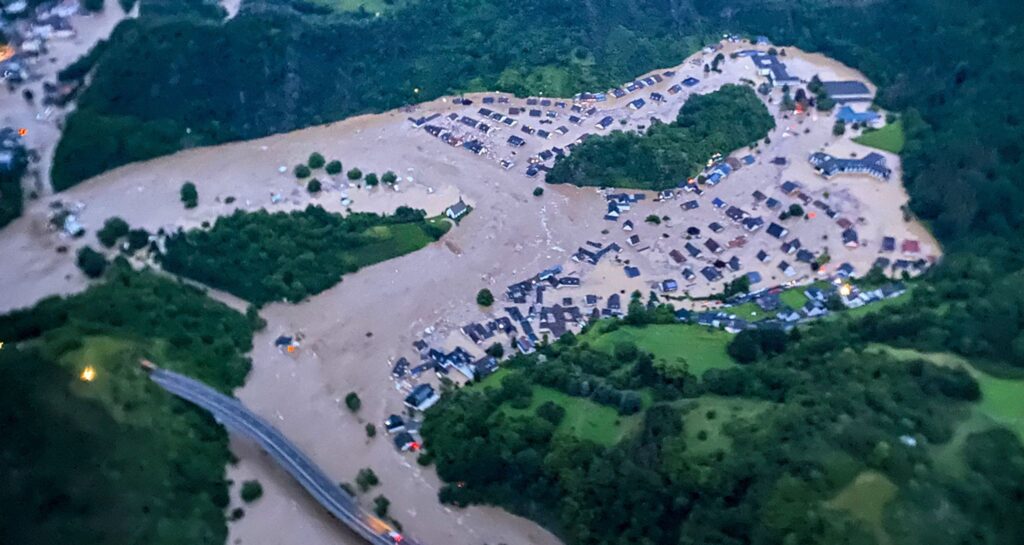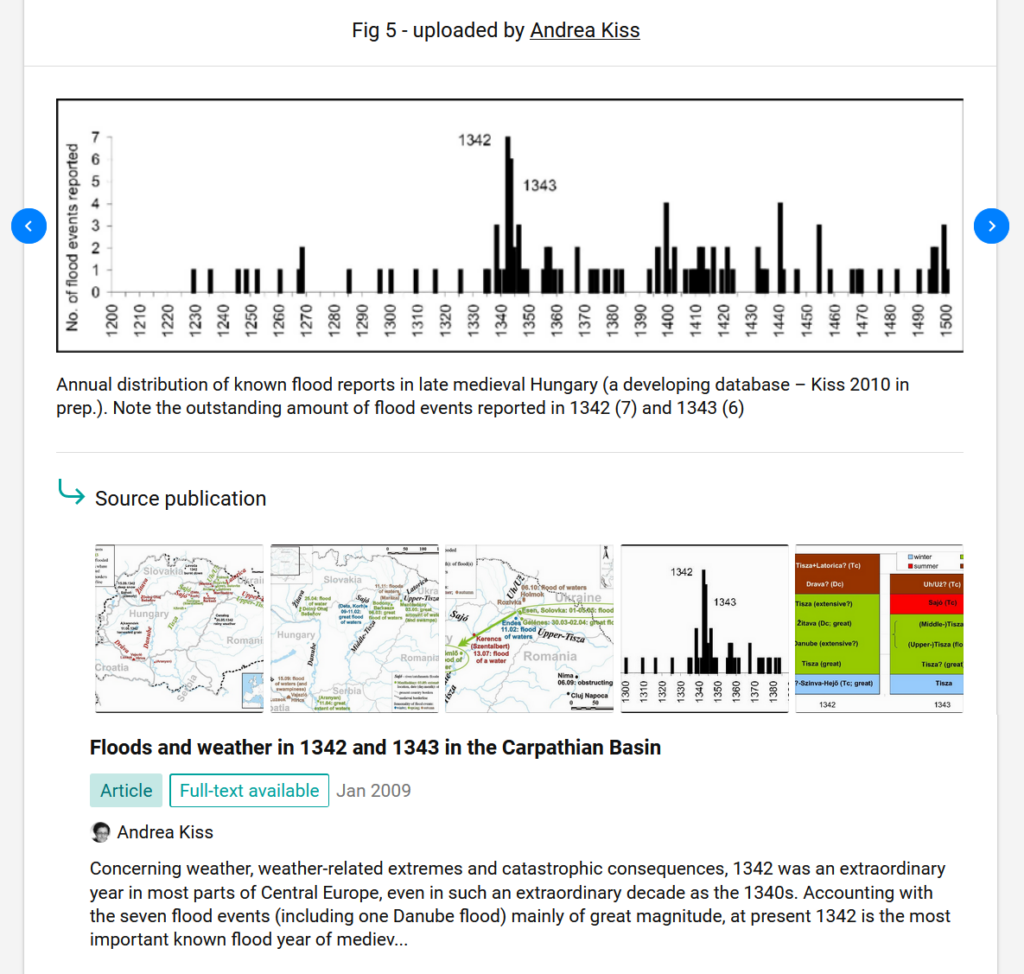I see flooding is in the news again.

The Welt is reporting 1,300 people are missing. The number of dead in west-central Germany is over a hundred confirmed, and dozens more dead in Belgium. Many of these deaths are people in care facilities unable to easily move under their own power and when the flood came they were goners. A few rescue workers, of various fire departments, were also killed.
At about the same time South Africa had a man-made disaster of mass looting, but I aim now to stick to non-man-made disasters–though of course many will reply that major floods are also man-made, because of human-caused Climate Change. So it gets complicated. In any case, the agent of destruction is rain, which is not a human hand (as in the looting and arsons in South Africa), so that’s the line I’ll draw for now and revisit the Climate Change thing shortly.
There were big floods in Germany and the Czech Republic in 2002. In the annals of European history, major floods on basically this scale (like 2002 and 2021) are recorded several times each century. Of course people alive at any given moment think theirs are special. How will this 2021 flood rank? Probably not the worst of the century. But human psychology is such that many want to believe “we have never seen anything like this.”
(Some years ago I wrote several times about this topic, while observing the chatter about the odd behavior of the Monsoon Season in Korea. There is wide consensus that the monsoons acted weird in several years of the 2010s. Post-89: “Monsoon Season 2013 Comes Early”; Post-90: “Early Monsoons and Climate Change”; Post-91: Korean Monsoon Average Onset Dates, 2005-2013…)
_____________
I learn, in connection with someone’s commentary on these July 2021 floods, that the very worst recorded floods in central European history were back in 1342, when entire cities were inundated.
There were actually a series of floods over two years (1342-43). The flood and immediate aftermath may have killed some number in the high tens of thousands, those being the direct deaths. Given the economic damage from the floods, probably some number in the high hundreds of thousands died indirectly in the coming year or two or three, and it is said two straight terrible harvests were recorded, as the flood had damaged soils in addition to all the other damage it did to major centers of commerce. Then, in 1349 and 1350, the Pest arrived at these same places, known to us as Bubonic Plague or the Black Death.
Whereas the floods of 1342 might claim a total in the high hundreds of thousands, the Plague by the early 1350s could claim into the millions. It’s a tempting conjecture to think that the floods of 1342 (and others in 1343) softened up parts of Europe for the Pest, when it made its first appearance in Europe a few years later.
I had never heard of the Flood of 1342 before today. It came down on a still Malthusian Europe (existing within the “Malthusian Trap”), and was one of several disasters and mass-death-and-disruption events which a long-lived person of the day would live to see, even if 1342 were particularly incredible, reaching twice the high-water-mark as some of the major floods of our era.
We post-Malthusians expect it as our birthright to be forever immune from Nature. We are too good for it. We are geniuses, for we have broken free from Malthus and are masters of our destiny. When natural events do occur, many are willing to embrace a new kind of religion to explain them.
We usually assume pre-modern people thought floods or the like were God’s punishment, and while many still today believe some version of that, the most dynamic type of Western and Westernized person scoffs at the idea, but readily embraces Climate Change, almost replacing the God’s Punishment on Sinful Man idea with close versions of the same using climate-change talk. I could have predicted the kind of stories that are now coming out on the German floods: Some variant of “Climate Change Caused Floods in Europe” is all over.
Lots of people readily believe this (of course wildfires, floods, or earthquakes are caused by Climate Change; what are you, some kind of bigoted nut of little faith? Repent! The end is near!).
There is little need for any persuasion, somehow wanting to believe and not voicing doubts, which are telltale signs of a religion. This is all still true even if/when climate change is “real,” which is the tricky part of talking about this. It seems extremely likely to me that our activities could/would raise global temperature, but the existence of a general civic religion around such a fact is separate.
In brief searching for 1342 flood material, I see someone graphed out major flood events on the Hungarian Danube from 1200 to 1500, long before anyone started burning coal anywhere:

The Big One of 1342 was preceded by earlier ones, and in general it looked like all of a sudden enormous Climate Change was upon the world in the 1340s. Again in the 1390s-1410s there seemed to be floods all the time. Other times years would pass without one.
In my long search for why people so readily embraced destructive Flu Virus Paranoia in 2020, and how the erection of a new state cult around a Forever War Against Flu Viruses came about, I came to think it must be something deeper than a few conspiracy-theory-like rumors and grainy videos of people in hazmat suits in the Chinese interior followed by a mad-scientist’s crazy bell-curve projections of Millions of Deaths. Those things, and the other features of the early Flu Panic, were basically exposition, or at best weak plot points, lifted from any number of Killer Virus or Zombie movies (people are often turned zombie by a virus, after all).
There had to be predecessors to the astonishing social phenomenon to witness of society embracing Flu Virus Paranoia and willing to deal large-scale damage to their own fellow citizens to placate the Flu Virus gods. Was Climate Change was one of these predecessors? I reluctantly conclude that signs point to yes. It was far less successful than the Flu Panic of 2020-21, but at core there are some important similarities. Both sides may overplay their hand but put religion-like certainty into not just the rightness of their positions, but the moral rightness, and the moral need to crush naysayers or skeptics. Certainly this was true of the “Covid” Panic.
_______________
Flooding news reminds me of is my beloved old job, a job I walked away from in my early twenties because I was worried I would get too comfortable and never leave, and felt I had something out there to accomplish, somewhere.
Sometime back there I worked in mapping. One of the big tasks was creation and maintenance of flood maps for insurance purposes and for disaster-planning purposes, so flood news sometimes brings back those memories. FEMA was one of the clients for some of the projects.
There was a lot of money in this flood mapping. The ultimate source of the money I think was taxpayers, for when the client was not FEMA (“federal” tax dollars) they were invariably local or state governments. I didn’t like to think about that part, and instead focused on doing the task as best as we could do it.
At the time we were making maps using the best new techniques, which meant basing them on the fieldwork of a laser contraption known as LiDAR. It was a fun job, I excelled at it, the level of office politics was minimal, and most people seemed happy. I got to listen to audio books much of the day when deep into the map tasks.
I can’t have been the only one to have had the sneaking suspicion that all of our work might be for nothing, if the global warming / climate change people were right. We were drawing ten-year flood lines, fifty-year flood lines, hundred-year flood lines, and what if none of it was applicable to the 21st century?
If I had stuck around there, or if I had successfully gotten my job back after leaving for Korea the first time (the recession of 2009, which lingered into the 2010s, disallowed that; they’d have loved to have had me, as I heard from the directly) I’d have gotten to some position of responsibility there, but as it was, I had little.
I’d love to revisit those maps now, and spot-check how many times flood waters hit the various thresholds (10-year flood line, 50-year flood line, etc.) since we made those maps.
Come to think of it, I wonder how the concept of flood-lines are even handled, now that Climate Change is rather more powerful than it was. The thought that flood-mapping may be a giant wasted exercise in such changing conditions is not a hard insight to make.
